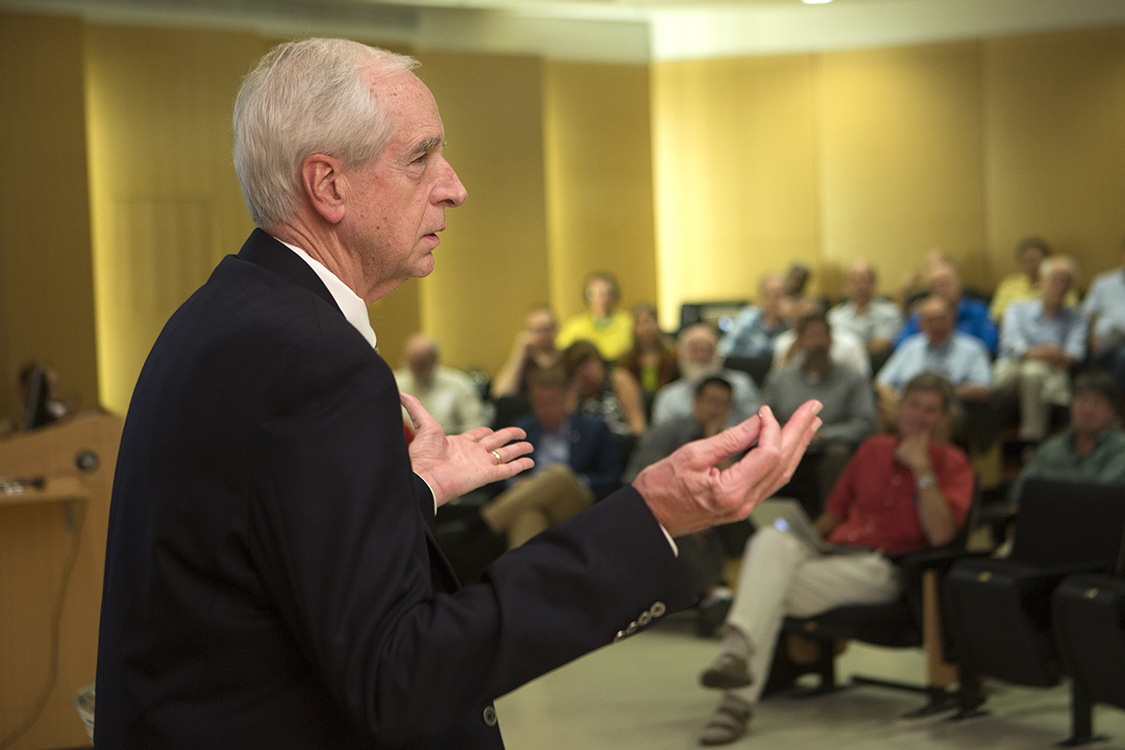Rawlings catalyzes faculty review of undergrad curriculum
By Susan Kelley

Interim President Hunter Rawlings is prompting the Cornell faculty to review undergraduate curriculum this year with an emphasis on the value of a liberal education.
“Cornell has rarely, if ever, talked about undergraduate education across the campus. We talk about it within the colleges, but we almost never consider the education all Cornell undergraduates receive from a unified perspective,” Rawlings said before discussing the initiative at the Sept. 14 faculty Senate meeting. “I would like to stimulate a conversation this year across the colleges.”
Rawlings defines “liberal education” as one faithful to its original meaning in Latin: “education for free citizens” who are capable of participating in civic affairs and government. Liberal education, he noted, “is distinguished from purely vocational education and emphasizes critical thinking, moral reasoning, close reading, clear speaking and writing, and the capacity to conduct independent and collaborative research.”
“The faculty owns the curriculum. It is their business,” he emphasized. But the time is right for a comprehensive review, he said, for several reasons.
As president of the Association of American Universities for the past five years, he has seen a nationwide loss of faith in liberal education. That loss is tied to a strong emphasis on vocational education – a degree as a ticket to get a job. “Research universities have not done much to define and defend liberal education,” Rawlings said.
In Rawlings’ view, the College of Arts and Sciences is central to the discussion: it has Cornell’s core departments such that the other colleges rely on it for many of their students’ requirements and electives.
Moreover, the College of Arts and Sciences is reviewing its curriculum for the first time in 15 years. “If the Arts College does a serious reform, it could have a big impact on all the colleges. That’s another reason for us to start thinking about this as a whole,” Rawlings said.
Laura Brown, the John Wendell Anderson Professor of English, is leading that review.
Another important assessment is also taking place. The Task Force for the Humanities and Arts, appointed in the spring by Provost Michael Kotlikoff, is focusing on research in those areas and considering initiatives that would enhance possibilities for interdisciplinary research and scholarship. “We’re also looking at curricular issues as crucial to the mission of Cornell, the educational experience of our undergraduates, and the centrality of the humanities and arts in both,” said Paul Fleming, professor of comparative literature and of German studies, who heads the task force.
The two review groups are working closely together, Fleming added.
Dean of the University Faculty Charles Van Loan has a strong interest in the initiative. “I am in favor of anything that deepens our understanding of what it means to be liberally educated, and the curriculum initiative will do just that,” said Van Loan, the Joseph C. Ford Professor of Engineering and professor of computer science. “The beauty of decentralized Cornell, with its seven undergraduate colleges, is that we actually have a chance to get it right. No single college can fully rejuvenate its curriculum and its definition of breadth without paying attention to its six neighbors – a coupling that requires liberally educated faculty all around. I know we can do it.”
In addition to the Senate, Rawlings has presented the idea of a curriculum review to the college deans, the department chairs in the College of Arts and Sciences, the University Faculty Committee, and individual faculty members.
A number of faculty members have mentioned proposing courses that could be offered to or required of all undergraduates, he said. The Faculty of Computing and Information Science has proposed a fundamental course in statistics and data science that it says would benefit all students, given their immersion in the digital world. “The University of California, Berkeley, has attracted attention with a course designed along these lines, and other universities are looking at it with interest,” Rawlings said.
Stanford and Harvard have recently reviewed and altered their undergraduate curricula, and Princeton is currently reviewing its curriculum, he said.
Rawlings said he hopes the whole campus will discuss the issue. With the support of Robert S. Harrison ’76, chairman of the Cornell University Board of Trustees, Rawlings will also ask the trustees to discuss undergraduate curriculum and the meaning and significance of liberal education.
The review’s time frame depends on the faculty, Rawlings said, but he hopes the discussion will continue through the entire academic year.
Media Contact
Get Cornell news delivered right to your inbox.
Subscribe